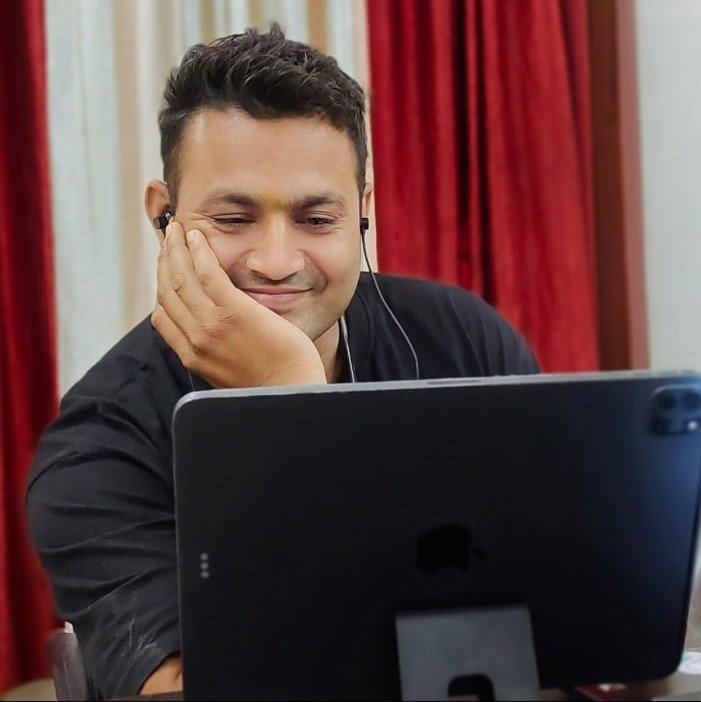Master C Programming in Jaipur, Rajasthan at Groot Academy
Welcome to Groot Academy, Jaipur's top institute for IT and software training. Our extensive C Programming course is crafted to provide you with the foundational skills and advanced techniques needed to excel in software development and programming.
Course Overview:
Are you ready to master C Programming, the cornerstone of many modern programming languages? Join Groot Academy's premier C Programming course in Jaipur, Rajasthan, and advance your coding skills to new heights.
- 2221 Total Students
- 4.5 (1254 Ratings)
- 1256 Reviews 5*
Why Choose Our C Programming Course?
- Comprehensive Curriculum: Delve into the core concepts of C Programming, including variables, control structures, functions, pointers, arrays, and file handling.
- Expert Instructors: Learn from seasoned professionals with years of experience in C Programming and software development.
- Hands-On Projects: Engage in practical projects and assignments to apply your knowledge and enhance your problem-solving skills.
- Career Support: Benefit from our extensive network of industry connections and receive personalized guidance to boost your career in software development.
Course Highlights:
- Introduction to C Programming: Gain a solid understanding of C language fundamentals, including syntax, data types, and operators.
- Control Structures: Master loops, conditionals, and functions to write efficient and reusable code.
- Advanced Topics: Explore pointers, dynamic memory allocation, and file operations to deepen your programming expertise.
- Practical Applications: Learn to implement C Programming concepts through real-world projects and case studies.
Why Groot Academy?
- Modern Learning Environment: Enjoy state-of-the-art facilities and resources designed to enhance your learning experience.
- Flexible Learning Options: Choose from weekday and weekend batches to accommodate your schedule.
- Student-Centric Approach: Benefit from small batch sizes that ensure personalized attention and effective learning.
- Affordable Fees: Take advantage of our competitive pricing and flexible installment options.
Course Duration and Fees:
- Duration: 6 months (Part-Time)
- Fees: ₹------(Installment options available)
Enroll Now
Begin your journey to mastering C Programming with Groot Academy. Enroll in the best C Programming course in Jaipur, Rajasthan, and take a significant step toward a successful career in software development.
Contact Us
- Phone: +91-8233266276
- Email: info@grootacademy.com
- Address: 122/66, 2nd Floor, Madhyam Marg, Mansarovar, Jaipur, Rajasthan 302020
Instructors

Shivanshi Paliwal
C, C++, DSA, J2SE, J2EE, Spring & Hibernate
Satnam Singh
Software ArchitectA1: In Module 1, you will learn the fundamentals of C programming, including its history, features, and the structure of a C program.
A2: No prior experience is required. This module is designed for beginners and will cover the basics of C programming.
A3: The key components of a C program include the main function, preprocessor directives, and statements.
A4: Learning C programming is crucial as it forms the foundation for understanding other programming languages and system-level programming.
A5: Yes, you will be able to write and run your first simple C program by the end of this module.
A6: You can use any standard C compiler and IDE such as GCC, Code::Blocks, or Dev-C++.
A7: Yes, additional reading materials and resources will be provided for those who wish to delve deeper into C programming.
A8: The course content is delivered through a mix of video lectures, reading materials, and hands-on exercises.
A9: Yes, there will be quizzes and assessments to test your understanding of the basic concepts covered in this module.
A10: You can get help through the course forum, office hours, or by contacting the instructor directly.
A1: In Module 2, you will learn about the basic concepts of C, including data types, variables, and constants.
A2: Data types in C define the type of data that can be stored and manipulated within a program, such as int, float, char, and double.
A3: Variables are important because they are used to store data that can be manipulated during program execution.
A4: A variable's value can change during program execution, whereas a constant's value remains the same throughout the program.
A5: You declare a variable by specifying the data type followed by the variable name, e.g., `int age;`.
A6: Yes, you can declare a constant using the `const` keyword, e.g., `const int MAX = 100;`.
A7: Variable names must start with a letter or underscore, followed by letters, digits, or underscores, and cannot be a reserved keyword.
A8: You can initialize a variable at the time of declaration, e.g., `int age = 25;`.
A9: The `printf` function is used to output data to the console, making it essential for displaying program results.
A10: Yes, there will be hands-on exercises to practice declaring, initializing, and using variables and constants.
A1: In Module 3, you will learn about operators and expressions in C, including arithmetic, relational, logical, and bitwise operators.
A2: Operators are symbols that perform operations on variables and values, such as `+`, `-`, `*`, `/`, and `%`.
A3: An expression is a combination of variables, constants, and operators that evaluates to a value, e.g., `a + b * c`.
A4: Unary operators operate on a single operand, while binary operators require two operands.
A5: Arithmetic operators perform mathematical operations like addition, subtraction, multiplication, division, and modulus.
A6: Relational operators compare two values and return a boolean result, e.g., `==`, `!=`, `>`, `<`, `>=`, and ` <=`.< /p>
A7: Logical operators are used to combine or invert boolean expressions, e.g., `&&` (AND), `||` (OR), and `!` (NOT).
A8: Bitwise operators perform operations on the binary representations of integers, e.g., `&`, `|`, `^`, `~`, ` <<`, and `>>`.
A9: Assignment operators are used to assign values to variables, e.g., `=`, `+=`, `-=`, `*=`, `/=`, and `%=`.
A10: Yes, there will be exercises to practice using different types of operators and creating expressions.
A1: In Module 4, you will learn about control statements in C, including `if`, `else`, `switch`, `while`, `for`, and `do-while` statements.
A2: Control statements manage the flow of a program by allowing conditional execution and looping.
A3: The `if` statement executes a block of code if a specified condition is true.
A4: The `if` statement evaluates conditions using relational operators, while the `switch` statement selects among multiple possible values of a single expression.
A5: The `while` loop continues as long as a condition is true, while the `for` loop iterates a fixed number of times based on initialization, condition, and increment/decrement.
A6: The `do-while` loop ensures that the loop body is executed at least once before checking the condition.
A7: The `break` statement exits a loop prematurely, while the `continue` statement skips the current iteration and proceeds with the next iteration of the loop.
A8: Nested control statements involve placing one control statement inside another, allowing for more complex decision-making and looping.
A9: `else-if` allows for multiple conditional checks, executing different blocks of code based on various conditions.
A10: Yes, there will be exercises to practice writing and using various control statements in C programming.
A1: In Module 5, you will learn about functions in C, including their declaration, definition, and usage.
A2: A function is a block of code designed to perform a specific task and can be called from other parts of the program.
A3: You declare a function by specifying its return type, name, and parameters, e.g., `int add(int a, int b);`.
A4: The `return` statement ends the function execution and optionally returns a value to the caller.
A5: You define a function by providing its implementation after the declaration, e.g., `int add(int a, int b) { return a + b; }`.
A6: The declaration provides the function signature, while the definition provides the actual code that executes when the function is called.
A7: Yes, functions can call other functions, allowing for modular and reusable code.
A8: Function arguments are values passed to a function, while parameters are the variables in the function definition that receive these values.
A9: C does not support function overloading natively. You can achieve similar functionality using different function names.
A10: Yes, there will be exercises to practice declaring, defining, and using functions effectively.
A1: In Module 6, you will learn about arrays and strings in C, including their declaration, initialization, and manipulation.
A2: An array is a collection of elements of the same type stored in contiguous memory locations.
A3: You declare an array by specifying the type and size, e.g., `int numbers[10];`.
A4: Strings are arrays of characters terminated by a null character (`\0`).
A5: You can initialize an array at the time of declaration, e.g., `int numbers[] = {1, 2, 3, 4, 5};`.
A6: Common string functions include `strlen()`, `strcpy()`, `strcat()`, and `strcmp()`.
A7: You access elements of an array using indices, e.g., `numbers[0]` for the first element.
A8: Yes, you can pass arrays to functions by specifying the array name as a parameter.
A9: Pointer notation allows accessing array elements using pointers, e.g., `*(numbers + i)`.
A10: Yes, there will be exercises to practice declaring, initializing, and manipulating arrays and strings.
A1: In Module 7, you will learn about pointers in C, including their declaration, usage, and how they interact with arrays and functions.
A2: A pointer is a variable that stores the memory address of another variable.
A3: You declare a pointer by specifying the type followed by an asterisk, e.g., `int *ptr;`.
A4: The `&` operator is used to get the address of a variable, while the `*` operator is used to access the value at the address pointed to by a pointer.
A5: Pointers can be used to access and manipulate array elements by using pointer arithmetic.
A6: Pointer arithmetic involves operations like addition and subtraction to navigate through memory addresses, e.g., `ptr + 1` moves to the next memory location.
A7: Function pointers are pointers that store the address of a function, allowing functions to be called indirectly.
A8: You pass pointers to functions by specifying the pointer type in the function parameter list, e.g., `void func(int *ptr);`.
A9: Null pointers are pointers that are assigned a value of `NULL`, indicating they do not point to any valid memory location.
A10: Yes, there will be exercises to practice declaring, using, and manipulating pointers.
A1: In Module 8, you will learn about structures and unions in C, including their declaration, usage, and differences.
A2: A structure is a user-defined data type that groups related variables of different types into a single unit.
A3: You declare a structure using the `struct` keyword followed by the structure definition, e.g., `struct Person { char name[50]; int age; };`.
A4: A union is a user-defined data type that allows storing different data types in the same memory location.
A5: You declare a union using the `union` keyword followed by the union definition, e.g., `union Data { int i; float f; char str[20]; };`.
A6: Structures allocate separate memory for each member, while unions share the same memory location for all members.
A7: You access members of a structure using the dot operator, e.g., `person.age`.
A8: Yes, you can use a union to store an integer, a float, or a string, but only one at a time.
A9: Structures and unions can be passed to functions as parameters or returned from functions to manage complex data.
A10: Yes, there will be exercises to practice declaring, using, and manipulating structures and unions.
A1: In Module 9, you will learn about file handling in C, including how to open, read, write, and close files.
A2: You open a file using the `fopen()` function, specifying the file name and mode (e.g., "r" for reading, "w" for writing).
A3: File modes specify the type of access you need for the file, e.g., "r" for reading, "w" for writing, and "a" for appending.
A4: You read from a file using functions like `fread()`, `fgets()`, or `fgetc()`.
A5: You write to a file using functions like `fwrite()`, `fprintf()`, or `fputc()`.
A6: You close a file using the `fclose()` function.
A7: A file pointer is a variable that holds the address of a file stream and is used to perform operations on the file.
A8: Common errors include file not found, permission denied, and file read/write errors.
A9: File positioning functions like `fseek()`, `ftell()`, and `rewind()` help in navigating and managing the current position in the file.
A10: Yes, there will be exercises to practice opening, reading, writing, and closing files.
A1: In Module 10, you will learn about dynamic memory allocation in C, including how to allocate and deallocate memory at runtime.
A2: Dynamic memory allocation allows programs to allocate memory during runtime using functions like `malloc()`, `calloc()`, `realloc()`, and `free()`.
A3: You allocate memory dynamically using the `malloc()` or `calloc()` functions, specifying the number of bytes needed.
A4: `malloc()` allocates memory without initializing it, while `calloc()` allocates memory and initializes it to zero.
A5: You deallocate memory using the `free()` function to prevent memory leaks.
A6: A memory leak occurs when allocated memory is not properly deallocated, causing the program to consume more memory over time.
A7: You resize allocated memory using the `realloc()` function, specifying the new size.
A8: Common issues include memory leaks, dangling pointers, and fragmentation.
A9: You check if memory allocation was successful by verifying if the returned pointer is not `NULL`.
A10: Yes, there will be exercises to practice allocating, resizing, and deallocating memory dynamically.
Amit Sharma
Priya Verma
Vikram Rathore
Neha Jain
Rohit Sinha
Anjali Patel
Saurabh Mehta
Divya Gupta
Arjun Bansal
Sneha Reddy
Get In Touch
Ready to Take the Next Step?
Embark on a journey of knowledge, skill enhancement, and career advancement with
Groot Academy. Contact us today to explore the courses that will shape your
future in IT.


